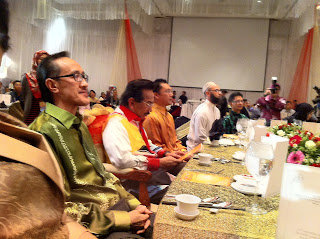
 Day Two
Day Two
The second day continued with two plenary sessions in the morning. Plenary Session 3 focused on "Challenges in Implementing the Financial Action Task Force Recommendation related to Risk-Based" - with spekers from AUSTRAC, Citibank Hong Kong and ORACLE Practice Solution consultant from India. One of the biggest challenges that regulators and financial institutions often have to face is the "subjectivity nature of the assessment" itself. Whilst one institution may consider a client to be of "low risk", another institution may classify the same client as "high risk". As such, it is necessary that financial institutions and other reporting institutions must provide detailed documentation to reflect how and why such "risk-based classification" was reached.

Plenary session 4 showcased "Anti-Money Laundering Success Stories". Panelists comprise the Director, Federal Special Task Force - Operations and Counter Terrorism of the Royal Malaysia Police; Deputy Director of Malaysian Anti Corruption Commission (MACC) and the FIU of Hong Kong. In Hong Kong, the FIU is part of the Police Department.
In the afternoon, three parallel sessions were held to discuss three important topics of (i) Terrorism Financing - Red Flags for Identification; (ii) International Financial Centres - What Can go Wrong, and (iii) Insurance Industry and Risk against AML-CFT.
The Final plenary session 5 on "Cyber Crime Trends, Impact and Safeguards to Business" saw discussions among practice solution developers. The closing remarks were deliberated by the CEO of AIF, Dr Raymond Madden.

 As part of our ongoing collaboration with the Malaysian Productivity Corporation (MPC), the Accounting Research Institute (ARI) conducted a one-day accounting program for assessors. Basically, the two groups of assessors who attended the program comprised of: (i) MPC assessors who assess the Quality Management Excellence Award (QMEA) and (ii) PROTON assessors who assess Vendor Quality Award. Basic Accounting Course for assessors is divided into three important parts. The first part examines key ratios which include (i) Return on Equity, (ii) Liquidity, (iii) Profitability, (iv) Asset Management and (v) Leverage. The second part covers comparative analysis of the company's performance via Horizontal and Vertical Analyses. Ration analysis on it own is meaningless unless it is benchmarked with the best in the industry or compared with previous years' performance. The third part of the course reviews management accounting techniques that should be adopted by companies to assist management to either control costs or to make the most strategic decision. In the afternoon, participants had to choose a company for them to evaluate. Based on what they have learned, they need to assess the financial performance of the company.
As part of our ongoing collaboration with the Malaysian Productivity Corporation (MPC), the Accounting Research Institute (ARI) conducted a one-day accounting program for assessors. Basically, the two groups of assessors who attended the program comprised of: (i) MPC assessors who assess the Quality Management Excellence Award (QMEA) and (ii) PROTON assessors who assess Vendor Quality Award. Basic Accounting Course for assessors is divided into three important parts. The first part examines key ratios which include (i) Return on Equity, (ii) Liquidity, (iii) Profitability, (iv) Asset Management and (v) Leverage. The second part covers comparative analysis of the company's performance via Horizontal and Vertical Analyses. Ration analysis on it own is meaningless unless it is benchmarked with the best in the industry or compared with previous years' performance. The third part of the course reviews management accounting techniques that should be adopted by companies to assist management to either control costs or to make the most strategic decision. In the afternoon, participants had to choose a company for them to evaluate. Based on what they have learned, they need to assess the financial performance of the company.





































